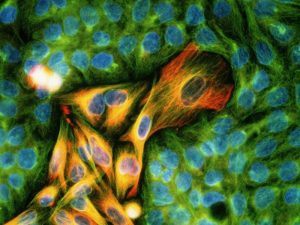Heidi Ledford in Nature:
 The stunning failure of a once-promising cancer drug has got some researchers arguing that the field has moved too fast in its embrace of therapies that unleash the immune system. The drug, epacadostat, blocks a protein called IDO that hobbles immune cells if left unchecked. Early trials suggested that the drug could be a powerful weapon against some advanced cancers when paired with existing therapies that bolster the body’s immune response to tumours. But a large, controlled study of epacadostat was halted in April after the drug failed to show benefits. Now, a researcher who helped to conduct some of the first trials of the drug says that it was pushed into large clinical studies too soon — and that the same could be true of other cancer immunotherapies in development. “People ask me right now, ‘What are you excited about?’” says Jason Luke, an oncologist at the University of Chicago in Illinois who aired his concerns last week at a meeting of the Society for Immunotherapy of Cancer in Washington DC. “And I say, ‘Unfortunately, little to nothing,’ because almost none of this is done properly.”
The stunning failure of a once-promising cancer drug has got some researchers arguing that the field has moved too fast in its embrace of therapies that unleash the immune system. The drug, epacadostat, blocks a protein called IDO that hobbles immune cells if left unchecked. Early trials suggested that the drug could be a powerful weapon against some advanced cancers when paired with existing therapies that bolster the body’s immune response to tumours. But a large, controlled study of epacadostat was halted in April after the drug failed to show benefits. Now, a researcher who helped to conduct some of the first trials of the drug says that it was pushed into large clinical studies too soon — and that the same could be true of other cancer immunotherapies in development. “People ask me right now, ‘What are you excited about?’” says Jason Luke, an oncologist at the University of Chicago in Illinois who aired his concerns last week at a meeting of the Society for Immunotherapy of Cancer in Washington DC. “And I say, ‘Unfortunately, little to nothing,’ because almost none of this is done properly.”
Early data from small trials of epacadostat, which is made by Incyte of Wilmington, Delaware, excited researchers. Luke recalls one trial participant with advanced cancer who was so weak that it was difficult for him to travel to the clinic. From the first dose, the man showed improvement. But Luke now attributes those gains to the treatment given alongside epacadostat in the trial: an approved immunotherapy called pembrolizumab, made by Merck of Kenilworth, New Jersey.
After Incyte and Merck reported in April that a larger trial of epacadostat and pembrolizumab had failed, other companies announced that they were halting their own programmes to develop cancer drugs that block the IDO protein. “The field has completely evaporated,” says Luke, who notes that more than 1,000 participants were once enrolled across various studies of IDO-inhibiting drugs. This failure should be a wake-up call for other cancer researchers, says Felipe Campesato, a cancer immunologist at Memorial Sloan Kettering Cancer Center in New York City. “We can take that challenge as an opportunity for improvement, and maybe a turning point in the field.”
More here.
